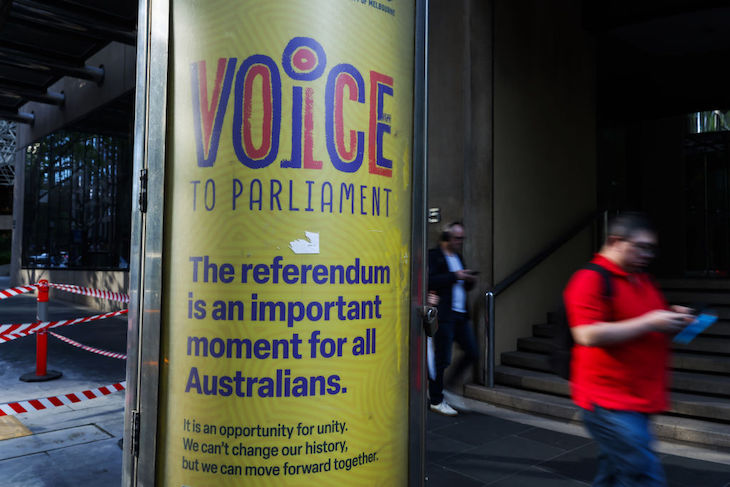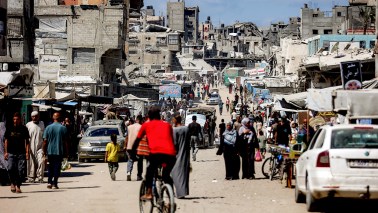Almost 250 years after European settlement, many of Australia’s Aborigines still face appalling socio-economic disadvantages compared to fellow Australians: lower life expectancy and school completion but high welfare dependency and incarceration rates, domestic violence, and endemic unemployment, truancy, alcohol and substance abuse. These are sad realities in such a prosperous nation as Australia.
Government statistics show overall per capita spending on an Indigenous person – about three per cent of the total population – is higher that for other Australians, funding health, welfare, education and employment programmes in a national effort known as ‘Closing the Gap’. Yet despite the billions spent over decades, that gap remains intractably wide.
Prime minister Anthony Albanese wants to close this gap by changing Australia’s constitution, calling a referendum today requiring a ‘double majority’ of both voters and the six states. He wants to constitutionally entrench a new body through which ‘Aboriginal and Torres Strait islanders can make representations to the parliament and the executive government on matters relating to Aboriginal and Torres Strait Islander peoples’. This body is to be formally called the Aboriginal and Torres Strait Islander Voice, popularly known simply as the Voice.
Can I ever look Aboriginal people I know in the eye again if I vote No?
The Voice emerged from a manifesto, the Uluru Statement from the Heart, by Aboriginal leaders and activists six years ago. In his election victory speech last year, Albanese – whose unwavering belief in the Voice’s rightness is genuine – declared, ‘on behalf of the Australian Labor party, I commit to the Uluru Statement from the Heart in full’. Indeed, as the campaign reached its end, Albanese seemed more preoccupied with it than managing Australia’s response to the barbaric Hamas atrocities that have appalled the civilised world this week.
The PM has framed the Voice proposal as a simplistic, feel-good message: backing Yes is a straightforward way of constitutionally recognising the oldest continuous culture in the world. But many Australians are more sceptical. Assured of success when Albanese was elected, current polling indicates the referendum faces heavy defeat, despite the Yes campaign’s near-unanimous backing by, and lavish financial and material support from, Australia’s political, cultural, sporting and corporate elites.
‘Once people worked out that the Voice was about so much more than a gracious acknowledgment that Aboriginal people were here first, it was going to be in trouble’, says former prime minister Tony Abbott. ‘Australians want to be fair to Aboriginal people, but that doesn’t mean giving them a special say in the government.’
There are a number of reasons for this likely outcome. Inconveniently for the Yes camp, the Uluru statement did not specify how the Voice would be constituted, nor define how broadly it would intrude into government decision-making. Albanese and the Yes campaign instead told people to vote Yes in principle and we’ll decide the details later. That deliberate vagueness, however, underpins the No case’s slogan, ‘If you don’t know, vote No’.
Many undecided voters worry that a Yes win will give a blank cheque to Aboriginal leaders and progressive activists. They fear it will legitimise their radical agenda of treaties, giving carte blanche to the rewriting of Australian history to demonise British settlement and exaggerate the legacies of colonialism. It won’t be long, some think, before massive reparation bills are presented for the injustices inflicted on Aborigines by long-dead generations of settlers.
The Voice debate certainly divides, instead of unites, Australians: parents against children, friend against friend, even Aborigine against Aborigine. Yet, ironically, central to both campaigns are clashing concepts of equality: Yes argues the Voice will give chronically-disadvantaged Aborigines equality with the other 97 per cent of Australians; No that the Voice gives constitutionally-privileged status to one ethnic group, Indigenous Australians, other Australians won’t have.
Aboriginal leaders are bitterly divided too. Aboriginal No leaders, especially the conservative MP who’s the face of the No campaign, senator Jacinta Nampijimpa Price, have been attacked viciously by some Aboriginal Yes supporters as ‘Uncle Toms’ betraying their own people, or branded with even worse epithets. Some outspoken No campaigners unwisely claimed the Voice is reverse ‘apartheid’, and others insultingly questioned the Aboriginality of some Indigenous journalists and activists.
In the campaign’s dying days, pro-Yes Aboriginal leader Noel Pearson – one of the most lyrical public speakers Australia has ever produced – unfairly reduced the decision to a binary moral choice for non-Aboriginal voters: vote Yes to be on the side of good; vote No and join the forces of darkness. Another Yes leader, academic and activist Marcia Langton, denounced the No campaign as ‘racist and stupid’.
Pearson’s binary polemic reflects how the Yes campaign fears its impending loss, having relied instead on overblown rhetoric, simplistic assertions and emotive button-pressing. Incessant and patronising browbeating by Australia’s elites to vote Yes, aggravated by their aggressive virtue signalling, identity politics and victimhood activism, merely validates many people’s sincerely-held doubts about the Voice, not overcomes them.
Even so, as with Brexit in 2016, the referendum outcome still can’t be assumed. ‘There’s an enormous amount of money and moral pressure for Yes, so no one can take the result for granted, despite the polls,’ says Abbott.
As with Brexit in 2016, the referendum outcome still can’t be assumed
Personally, my heart says Yes to the referendum premise that Aboriginal Australians need to be better listened to and consulted about decisions relating to their lives and aspirations. But my head emphatically says No, as this flawed and nebulous proposal is not it. Even so, my conscience asks: can I ever look Aboriginal people I know in the eye again if I vote No? I’m not sure I can, and it’s likely many white Australians face their own moral dilemmas.
If the polls are right about Albanese’s ill-judged, ill-timed and poorly executed referendum, on Sunday millions of Australians will be disappointed and angry, pro-Voice activists will denounce their fellow Australians with identity politics-driven rage, a great many Aborigines caught in the crossfire will wrongly feel rejected by their own country, and the noble cause of Closing the Gap seriously set back.
Some compare the Voice debate to Brexit, with urban elites backing Yes and Remain respectively, but this referendum has provoked even more visceral and polarising passions and emotions then Brexit ever did: instead of uniting Australia as the Voice’s advocates sincerely hoped, deep national wounds have been reopened and will take years, even decades, to heal.
Albanese was well-intentioned in honouring his election night promise, but this divisive and damaging referendum is proving disastrous for Australia, and for the very people he wants to help.






Comments